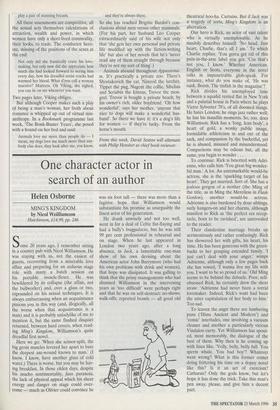One character actor in search of an author
Helen Osborne
MING'S KINGDOM by Nicol Wzilliamson Hutchinson, £14.99, pp. 246 Some 20 years ago, I remember sitting in a country pub with Nicol Williamson. He was staying with us, not the easiest of guests, recovering from a miserable love affair and preparing for an arduous stage role with many a butch session on his portable muscle-flexer. He was bewildered by its collapse (the affair, not the bullworker) and, over a glass or two, expounded on his sexual techniques. It is always embarrassing when an acquaintance pinions you in this way (and, illogically, all the worse when that acquaintance is a man) and it is probably unladylike of me to mention it, but the same flushed disquiet returned, between hard covers, when read- ing Ming's Kingdom, Williamson's quite dreadful first novel.
Here we go: 'When she scissor-split, the big groin muscles levered her apart to bare the deepest axe-wound known to man.' (I know, I know, have another glass of cold water.) There is worse, but you may be hav- ing breakfast. In those olden days, despite his macho sentimentality, faux paranoia, the lack of physical appeal which his sheer energy and danger on stage could over- come — much as Olivier could convince he was six foot tall — there was more than a fugitive hope that Williamson would substantiate his promise as unarguably the finest actor of his generation.
He drank unwisely and not too well, went in for a deal of Celtic fist-flaying and had a bully's bra adocio, but he was still 99 per cent professional in rehearsal and on stage. When he last appeared in London two years ago, after a long absence, in Jack, a lamentable one-man show of his own devising about the American actor John Barrymore (who had his own problems with drink and women), that hope was dissipated. It was galling to think that the prissy managements who had shunned Williamson in the intervening years as 'too difficult' were perhaps right and that he was on self-destruct: no-shows; walk-offs; reported brawls — all good old theatrical hoo-ha. Curtains. But if Jack was a- tragedy of sorts, Ming's Kingdom is an aberration.
Our hero is Rick, an actor of vast talent who is virtually unemployable. As he mushily describes himself: 'No head. Just heart, Charlie, that's all I am.' To which Charlie replies: 'You gorra get rid of this pain-in-the-arse label you got. 'Cos that's not you, I know.' Whether American, English or Scots, everyone in the novel talks in impenetrable glob-speak. For instance, what do you make of, 'He was sunk. Boom. The tinfish in the magazine'?
Rick divides his unemployed time between a squalid rented flat in New York and a palatial house in Paris where he plays Victor Sylvester 78's, of all doomed things. He hates London; he sings jazz rather well; he has his maudlin moments. So, too, does Williamson. Rick has a 'long, lean body', a heart of gold, a wonky public image, formidable athleticism in and out of the sack, and compassion by the bucketful, yet he is abused, misused and misunderstood. Comparisons may be odious but, all the same, you begin to wonder . . .
To continue: Rick•is besotted with Adri- enne, who calls him 'You great big wonder- ful man.' A lot. An unremarkable would-be actress, she is the 'sparkling target of his heart'. They get married. Sort of. She has a jealous gorgon of a mother (the Ming of the title, as in Ming the Merciless in Flash Gordon), another would-be actress. Adrienne is also burdened by dour siblings, surly hangers-on and her charms, although manifest to Rick as 'the perfect sex recep- tacle, born to be ravished', are unrevealed to the reader.
Their clandestine marriage breaks up acrimoniously and rather confusingly. Rick has showered her with gifts, his heart, his time. He has been generous with the green- backs to her grasping extended family. 'I just can't deal with your anger,' wimps Adrienne, although only a few pages back she has vowed, 'I wanna live my life with you. I want to be so proud of us.' Old Ming seems to be behind the debacle. Poor, self- obsessed Rick, he certainly drew the short straw: 'Adrienne had never been a torrid lovemaker. Indeed, Rick's want had been the utter capitulation of her body to him.' Too sad.
To leaven the angst there are lumbering puns Mims Ancient and Modern') and `comic' interludes, one involving a vacuum cleaner and another a particularly vicious Vindaloo curry. Yet Williamson has spout- ed, most memorably, the dialogue of the best of them. Why then is he coming up with lines like, 'Velly, belly, belly full. You sperm whale. You bad boy'? Whatever went wrong? What is this former comet doing frittering his time on a dopey novel like this? Is it an act of exorcism? Catharsis? Only the gods know, but let's hope it has done the trick. Take this man's pen away, please, and give him a decent part.


































































 Previous page
Previous page